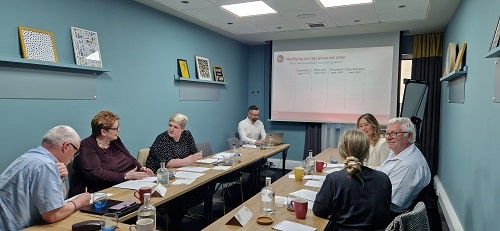New micro robots will be built to radically improve safety by inspecting in Britain’s most hazardous workplaces including nuclear power sites, as well as repairing Britain’s road network, under a £19.6 million government investment strategy, it has been announced.
News
Plans to build micro robots for projects announced
New micro robots will be built to radically improve safety by inspecting in Britain’s most hazardous workplaces including nuclear power sites, as well as repairing Britain’s road network, under a £19.6 million government investment strategy, it has been announced.
Scientists from four British universities will use £7 million government investment to develop 1 cm-long robotic devices that use sensors and navigation systems to find and mend cracks in pipes in the UK’s huge underground pipe network.
A further 14 projects have been awarded £19.6 million investment through the Industrial Strategy Challenge Fund (ISCF), which will see robots sent to hazardous workplaces such as offshore windfarms and nuclear decommissioning facilities.
Researchers will test new technologies, such as the use of artificial intelligence (AI) software on satellites in orbit to detect when repairs are needed, and drones for oil pipeline monitoring.
UK Research and Innovation (UKRI) chief executive, Professor Sir Mark Walport said: “The projects announced demonstrate how robots and artificial intelligence will revolutionise the way we carry out complex and dangerous tasks, from maintaining offshore wind farms to decommissioning nuclear power facilities.
“They also illustrate the leading role that the UK’s innovators are playing in developing these new technologies, which will improve safety and boost productivity and efficiency.”

HSE chair Martin Temple added: “As a regulator we want to encourage industry to think about how technologies such as robotics and AI can be used to manage risk in the workplace, safeguarding workers both now and in the future world of work.”
A joint statement made on 31 December 2018 from the Department for Business, Energy & Industrial Strategy, HSE, Innovate UK and UKRI, says that the work will also cut disruption caused by the 1.5 million road excavations that take place every year.
Science minister Chris Skidmore added: “While for now we can only dream of a world without roadworks disrupting our lives, these pipe-repairing robots herald the start of technology that could make that dream a reality in the future
From deploying robots in our pipe network to cutting down traffic delays, to using robots in workplaces to keep people safer, this new technology could change the world we live in for the better.”
NEWS

British Safety Council’s Keep Thriving workshops end on a high note in Edinburgh
By Kerry Reals on 16 May 2024
British Safety Council concluded six months of free-to-attend Keep Thriving workshops for SMEs and micro-sized businesses with an engaging three-hour session in Edinburgh on 14 May.

‘Obesity crisis’ is making people too sick to work, warns IPPR
By Kerry Reals on 10 May 2024
Obesity is contributing to rising economic inactivity levels in the UK and is making workers less productive, says the Institute for Public Policy Research (IPPR), which is calling for government intervention to crack down on ultra-processed foods and create an “obesity-free generation”.

UK population becoming more anxious and less satisfied, ONS wellbeing report shows
By Kerry Reals on 09 May 2024
One in 17 people in the UK have low life satisfaction and almost a quarter have high levels of anxiety, a new report focused on wellbeing by the Office for National Statistics (ONS) has revealed.



